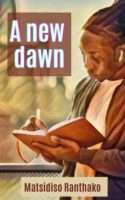I believe we take life for granted. We put things off for tomorrow because we know tomorrow will come. And when it comes, we expect it to be the same as yesterday. Of course, things cannot change overnight, but a huge shift has happened. Things are no longer the same.
Had anyone approached me before March 2020 and told me that we would be forcefully confined to our homes for the rest of the year, I would have called them crazy. In fact, I would have given them my sangoma’s number so they could book themselves an appointment for a cleansing.
Imagine walking into a shop and being afraid to buy your favourite smooth and silky rum and raisin chocolate that just melts on your tongue like an ice cube under the sun because you might get arrested. Imagine going to Woolworths and not finding their soft chocolate sponge cake because it is not classified as an ‘essential’. I don’t even want to mention soldiers chasing people down the streets, breaking beer bottles and making people do frog jumps because they found them drinking in their own yards! All of this does not make sense, right?
Come to think of it, life before COVID was great. I spent the most of my December of 2020 bathing at 8pm to leave the house at 10pm and come back at 5am in the morning. That is how you ‘December’ in the township. For us, December is a big deal – from the 16th until the 31st – everyday is the weekend. The sun does not set. We work hard during the year, fighting nosy colleagues and enduring slave-driving managers who run the workplace like a spaza they inherited from their uncle so we can wear new clothes every day and braai meat just because it smells good. Not to mention the bottles of expensive whiskey and cognac that our uncles only buy when they want to impress the new lady that sells at the tavern. In December, even the strict father who locks his gates and releases his dogs at 5pm loses his key. To be honest, that was the last ‘December’ we experienced as a country. Had I known that that would be the case, I would have made it a point to check off at least half of my bucket list.
In March of 2020 we received a call that my grandmother in Lesotho was not feeling well. She is my only surviving grandparent, a resolute of note. Nkhono had been through a lot in her then 77 years of life. From going under the operating table to restore her eyesight from total blindness to battling type two diabetes. Naturally, my mom panicked when she received the news because – as the eldest of her children – she was the one responsible for the old lady. So we packed up and headed on the long 8-hour drive to Leribe with my 11-month-old daughter and her 18-month-old cousin. Upon our arrival at the border, we found officers scanning people who were going in and out of the two countries for their temperatures. This was a total surprise for us. There was news of a new virus that had been found in China causing panic. There really was not a lot of information available about the new virus so we did not pay a lot of mind to it. I at least got to check off a few things from my bucket list – visiting my grandfather’s and uncles’ graves, horse riding, travelling out of the country and going to my father’s homeland. It was like a little vacation for me. We came back from Lesotho a week before the lockdown was announced and our lives were changed for ever.
It is said that change is good, but do we celebrate change that continuously takes from us our loved ones? Life has changed a lot in the past two years. People have lost their most loved ones – grandparents, parents, siblings, friends. I may be fortunate enough to not have buried any family members, but people around me were affected. Life post-lockdown means operating under fear and anxiety because you do not know who could be here now and gone tomorrow. Even at the slightest cough, you begin to sort out your affairs and start dividing your estate accordingly because Mkhize died and his kids started fighting over his estate. When you feel even the slightest headache, you call all your loved ones and tell them you love them because Aus’ Norah started complaining about a headache before she was found lying silently cold in her bed the next morning.
Life after COVID for me meant that I had to choose between spending money on entertainment and leisure, and giving it to my mother so she could pay for certain necessities in the house because business has been slow. I realise now how I took the opportunities and freedom I had for granted, and I truly regret it. I regret not grabbing life by both hands and running with it because things were a lot easier then than they are now.


